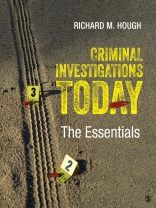Criminal Investigations Today: The Essentials examines the processes, practices, and people involved in the investigation of crime in a brief and accessible format that hones in on the key topics students actually need to know. Drawing from his vast experience in the field, author Richard M. Hough distills the essentials of criminal investigations and takes students through the in-depth processes of criminal investigations while maintaining a streamlined approach that allows for optimal student learning. The text’s focus on people within the investigative system is reinforced with running case studies and hands-on application.
Included with this title:
The password-protected Instructor Resource Site (formally known as SAGE Edge) offers access to all text-specific resources, including a test bank and editable, chapter-specific Power Point® slides.
Spis treści
Preface
Digital Resources
Acknowledgments
About the Author
Chapter 1 • Criminal Investigation Then and Now
Introduction: Criminal Investigation Then and Now
The Goals of Investigation
Types of Criminal Investigations
Four Stages of Criminal Investigation
Organizing the Investigative Unit
Task Force Investigations
Contemporary Law Enforcement and the Role of Criminal Investigation
Science and Technology in Criminal Investigation
Summary
Key Terms
Discussion Questions
Chapter 2 • Forensic Evidence: The Crime Scene and the Laboratory
Introduction
The Developing Science of Criminal Investigation
Methods of Collecting and Processing Evidence
Types of Physical Evidence and Its Processing
Equipment Utilized in Investigations
The Contemporary Forensic Laboratory
Personnel
Documenting the Crime Scene and Actions
The CSI Effect
Summary
Key Terms
Discussion Questions
Chapter 3 • People in the Process: Victims, Suspects, Witnesses, and Detectives
Introduction
Victims
Suspects
Investigators
Witnesses and Informants
Interviews
Interrogations
Technology
Summary
Key Terms
Discussion Questions
Chapter 4 • Managing the Criminal Investigation
Introduction
Investigation as a Process
Preliminary Investigation
Case Assignment and Solvability Factors
Follow-Up Investigation
Supervising the Investigative Unit
Case Management Software
Pitfalls, Fallacies, and Sloppiness in Investigations
Developing an Ongoing Relationship With the Media
Improving Productivity
Summary
Key Terms
Discussion Questions
Chapter 5 • Searches, Seizures, and Statements
Introduction
Fourth Amendment
Search Warrants
Making the Arrest
Fifth Amendment
Suspect Statements
Lineups and Showups
Sixth Amendment
Summary
Key Terms
Discussion Questions
Chapter 6 • Homicide, Death, and Cold Case Investigations
Introduction
Definitions and Legal Classifications of Cases
Medical Death Classifications
Preliminary Investigation and First Officers on the Scene
Arrival of the Detectives
Medical Examiners, Coroners, and the Autopsy
Criminal Homicide Methods
Suicide
Challenges in Death Investigations
Cold Cases
Serial and Mass Murder
Summary
Key Terms
Discussion Questions
Chapter 7 • Assault, Battery, Robbery, and Sex Crimes
Introduction
Assault and Battery
Robbery
Sex Crimes
Summary
Key Terms
Discussion Questions
Chapter 8 • Familial Crimes
Introduction
Domestic Violence
Intimate Partner Violence (IPV)
Child Abuse
Elder Abuse
Summary
Key Terms
Discussion Questions
Chapter 9 • Burglary, Theft, White-Collar Crime, and Cybercrime
Introduction
Burglary
Theft
White-Collar Crime
Identity Theft
Cybercrime
Summary
Key Terms
Discussion Questions
Chapter 10 • Drug Crimes, Organized Crime, and Gangs
Introduction
Drug Crimes
Investigating Drug Crimes
Organized Crime
Gangs
Summary
Key Terms
Discussion Questions
Chapter 11 • Terrorism and Homeland Security
Introduction
Terrorism
Homeland Security
Summary
Key Terms
Discussion Questions
Chapter 12 • Criminal Investigation in Court
Introduction
The Process: Screening and Filing
Evidentiary Issues
Defenses
Ethical Issues
Plea Bargaining
Sentencing
Summary
Key Terms
Discussion Questions
Glossary
References
Index
O autorze
Dr. Richard Hough has taught criminal justice and criminology courses in the college and university setting for twenty-five years and he has taught investigative methods and other law enforcement and corrections topics in the academy and in-service law enforcement setting for thirty years. This is added to the author’s extensive professional experience including investigating homicide. Dr. Hough has held increasingly responsible positions in law enforcement and has served as director of law enforcement and corrections in sheriff’s offices, as well as superintendent of detention centers for the Florida Department of Juvenile Justice. Dr. Hough has served as both a law enforcement and corrections academy director. He is currently a faculty member in the Department of Criminology and Criminal Justice at the University of West Florida.Dr. Richard Hough has conducted more than 100 training seminars, conference presentations, and international briefings on criminal justice issues and he is the primary instructor for contemporary policing practices and gangs and hate groups at the regional law enforcement academy in Pensacola, FL. Dr. Hough is a member of the Homicide Research Working Group (HRWG), the Police Executive Research Forum (PERF), the International Homicide Investigators Association (IHIA), the International Association of Chiefs of Police (IACP), the Southern Criminal Justice Association (SCJA) and the Academy of Criminal Justice Sciences (ACJS). Dr. Hough has been interviewed by local, regional and national news media and has appeared on radio and television speaking on criminal justice issues. He has published journal articles and book chapters. Dr. Hough actively consults as an expert witness on police and correctional practices and the use of force.












